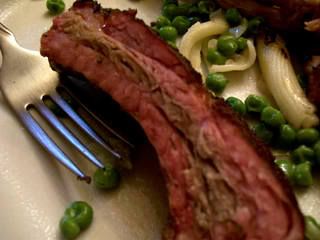I do like hickory with ribs but tend to mix it 50-50 with a fruit wood. Wod probably totals 1.5-2 fist-sized chunks.
From both what you've just described and the details upthread, I'm guessing you were cooking 30 or so degrees cooler at the actual cook spot than at the therm.
Is there an ideal time to cook ribs? -- Well, for me the ideal time is the shortest time I can cook them and still have the precise results I'm looking for.
Or a "target range"? I knew 8 hours seemed too long. But is 5 hours better than 3? -- It might have been 'too long' a cook, but it wasn't too long to get desirable results
based on the variables and dynamics of this particular cook. Had you pulled them an hour earlier they would not have been tender and you would likely have been disappointed.
5 hours is only 'better than 3', imo, if, due to the variables in that particulat cook, 5 hours is necessary for tender and pulling at 3 is way underdone. But if the question is whether changing the variables of a cook so that the ribs finish to tender in 3 hours is somehow not as good as a cook that takes 5 hours to get tender then, to me, the answer is no, 5 isn't better than 3.
Or are you going for something different with different times? --For me, timing is whatever is most convenient for me. Sometimes a 4- or 5-hour rib cook is more convenient than a 2-hour one so I'll go that route. Sometimes overnighting butts at lower temps is more convenient than cooking them higher/faster so I overnight them.
I get the idea with brisket and butts the longer the better. -- Not to me. In fact for brisket lower/slower is often worse. (I'm speaking of lower/slower than typical low/slow.) I do briskets in ~4 hours. I get the results I want so I don't see a need to go longer.
Butts are significantly thicker of course, so they certainly go longer than 4 hours. They also have a different structure than brisket--the muscle fiber structure is finer, they have more and larger internal fat deposits and more significant surface fat--so that has to be kept in mind. Since I prefer not to use foil on butts during cooking (foil: the great equalizer), my higher heat butts are not as high heat as where I cook briskets.
[Note that in all cases I am speaking of meats typically purchases at markets, not high grade beef nor pastured pork, both of which require different considerations.]
Now I see you start checking for doneness after a certain period if you have kept your cooking temp where it needs to be up to that point. -- Yes. Or perhaps if you realize that your cooktemps were higher for this cook than for prior cooks, deliberately or not, you'll also realize that you'll need to check sooner than you might otherwise.
I can probably get non-enhanced ribs at sam's club but it's more convenient to get them at walmart. -- Do so at least once (Sam's) and see how they compare to you. Remember that with pumped meats you are paying the per-pound meat price for what is essentially water. It's one of the ways Wal-Mart <STRIKE>rips you off</STRIKE> seeks profit.
Would it ruin them or cause them to dry out if I left them soaking in water for a time to soak off that solution? Or is that solution there to stay no matter what? -- If there is phosphates in the mix, or other water retention agents, soaking won't help. If not, you can and then see what you think. Soak a couple hours in cold water, changing it once, drain and dry very well. Note that any structural changes caused to the meat fibers by the solution will remain. (Try unpumped and see what you think. Convenience ain't everything.
)
From your cook it is apparent you are on the right track. And yup, Lohrentz gots his kettle cooking down.



